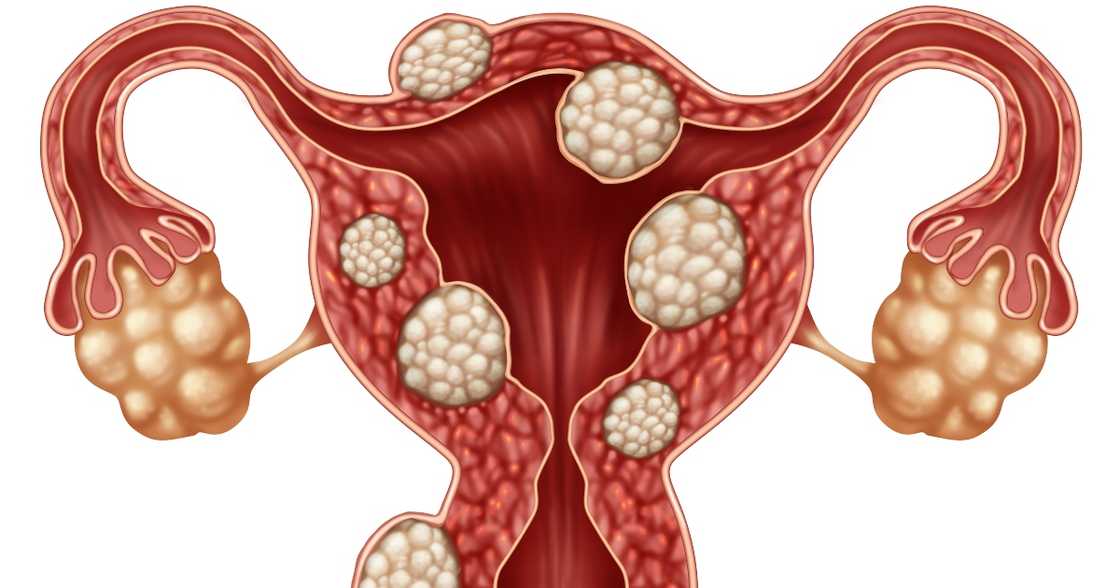Fibroids and Their Effect on the Female Reproductive System
The male body is susceptible to a lot of changes in its lifetime. A change in environment, diet, weight among other things can result in a disruption in its functions.
PAY ATTENTION: Click “See First” under the “Following” tab to see YEN.com.gh News on your News Feed!
The fertility of a woman can be influenced by several factors, one of which is fibroids.
YEN.com.gh seeks to highlight some of the role fibroids play in the fertility of the female reproductive system.
What are fibroids

Source: Getty Images
Enjoy reading our stories? Join YEN.com.gh's Telegram channel for more!
Fibroids are non cancerous tumors that grow in the uterus of a woman. They can develop at various locations within the womb during child bearing years.
Research indicates that fibroids are found in 20% of women of reproductive age, but are more common in African-American women (50%-80%).
There are women who may have fibroids but will not experience any symptoms.
Types of location
The non-cancerous mass are classified according to where they are located in the womb. There are different types;
Intramural Fibroids.
This type of fibroid is located within the muscular wall of the uterus.
Subserosal fibroids
They form at the outside wall of the uterus. When they grow big enough they make the womb appear bigger.
Subfibroids
These type of fibroids are the least common. They develop in the open space inside the uterus.
Cause of fibroids
The exact cause is unknown; however, research has pointed out hormones and heredity to be the major factors that potentially influence their growth.
The extent to which the stated factors instigate the formation of the fibroid is unknown.
Symptoms
It is essential for females to always be in tune with their body. Medical attention should be sought anytime an unusual change is observed in one's menstrual cycle.
Some of the symptoms of fibroid are listed below;
- Heavy menstrual flow
- Prolonged period
- Unbearable abdominal pain during menstruation
- Easily fatigued
- Severe anemia
- Frequent urination
- Difficulty conceiving
- Painful sexual intercourse
- Swollen abdomen
- Severe clots during menstruation
How fibroid results in heavy flow and anemia
The heavy mass tend to exert a lot of pressure against the walls of the womb. This makes it difficult for the uterus to contract and relax properly.
Fibroids also result in the production of alot of blood cells which brings about heavy menstrual flow.
Losing a lot of blood during menstruation due to fibroids means the heart has less blood to pump to the rest of the body hence it is forced to over work which brings about constant fatigue.
Fibroids and fertility
The fertility of the female reproductive system can be impacted by fibroids in three major ways; the size of the mass, the location and the treatment method adopted.
Below are some of the ways;
- The size and location of the mass can cause a blockage of the fallopian tube and prevent eggs from being fertilized
- The shape of the cervix can be affected which will affect the number of sperms that can enter the uterus
- The size of the uterine lining can be affected
- Blood flow which will help the ability of embryos to stick to the uterine wall can be affected
Treatment options
Fibroids are usually treated using surgical means depending on the size, location and the health conditions being posed. The surgery can however be invasive or less invasive.
The types of surgical procedures that can be adapted are ;
Myomectomy
This surgical procedure requires a large incision in the abdomen to access the fibroids.
The individual can be discharged three days after the surgery depending on their recovery process.
It takes about six weeks to heal from the surgery.
Laparoscopy
This is a minimally invasive method. It requires a small abdominal incision. An instrument known as laparoscope is used. It has a camera through which what is happening in the body can be seen on a screen.
The surgical tools are also inserted through the small incision to remove the fibroid.
Hysterectomy
This surgical method is resorted to when the condition is out of hand. Here, the the entire uterus needs to be removed.
Medication
There are also medications known as Gonadotropin-releasing hormone (GnRH) agonists that can help shrink the fibroids but that would mean missing out on ovulation which will result in the inability to conceive.
Answers to frequently asked questions about fibroid
Dr Otubua, a gynaecologist at the Takoradi Regional Hospital in an interview with YEN.com.gh has answered some of the questions that are constantly asked;
Is pregnancy possible with Fibroid?
Yes It is. If the size and location of the mass does not does not prevent eggs from being fertilized or block sperms from reaching the eggs, one can conceive. Make sure to consult your doctor.
Can one give birth naturally after fibroid removal surgery?
It is possible to give birth naturally but that will be determined by your doctor given your medical records. It is usually recommended that caesarean be carried out for such mother since they stand a chance of experiencing uterus rapture. Make sure to consult your doctor.
How many children can one have after the surgery?
We recommend four children after the surgery. The intention is to avoid putting the mother at risk of death. Do discuss with your doctor
Is it likely that the fibroids will return?
Yes, It is possible. They may resurface at least two years after removal. We therefore advise patients after the surgery to start planning towards having children soon after if they are interested.
When is it safe to be intimate with one's partner after the surgery?
Sexual intercourse can take place around the fourth month after surgery. Do take it slow. Make sure to consult your doctor as well.
At what point can one start trying for a baby?
You can start trying for a baby after 6 months. It is important to see your doctor with your partner three months before the 6th month.
YEN.com.gh earlier reported that a middle-aged Ghanaian lady named Mary Quansah was helped to undergo a delicate surgical procedure after being 'pregnant' with fibroids for 13 years.
According to a report sighted by YEN.com.gh on the official Facebook handle of the Crime Check Foundation, Mary returned after the surgery and expressed immense gratitude to the foundation for the good done to her.
When Mary's story first hit the internet, it was reported that her fibroid lasted for five years, but that has been subtly ruled out by the charity foundation's report.
Our manifesto: This is what YEN.com.gh believes in
Source: YEN.com.gh






